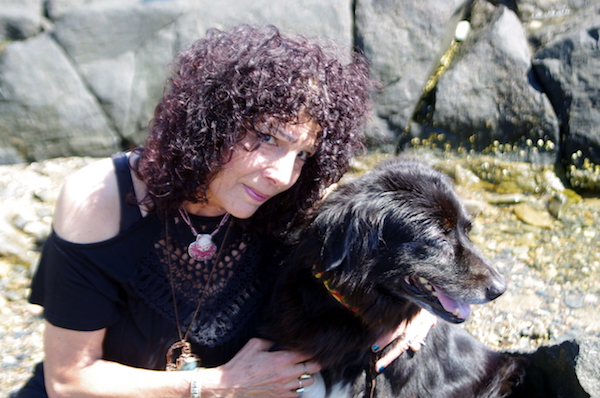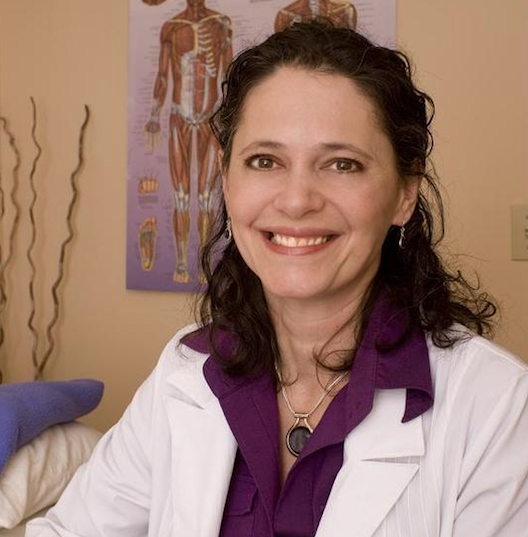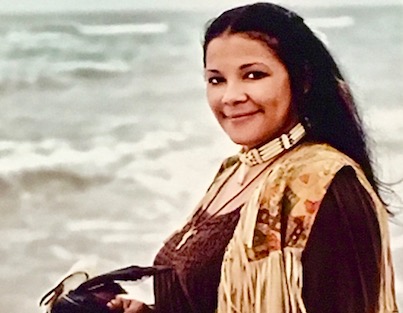Each month, Acupuncture Continuing Education (also known as “ACE”) has decided to feature an acupuncturist to share his or her experiences, expertise, and knowledge of practicing Acupuncture & Traditional Chinese Medicine. Sometimes, the best way to grow within a profession is to learn from your fellow colleagues, and hear how they help to achieve results for their patients. Stay tuned for additional interviews with acupuncturists across the United States & Canada.
Jeanie Mossa is an acupuncturist and Chinese herbalist living in Salem, MA. She is a former faculty member of the Canadian College of Oriental Medicine (Toronto, Canada) and has published four books on traditional Chinese and holistic medicine and theory, as well as authoritative articles on Oriental Medicine. She graduated with her masters degree in Traditional Oriental Medicine (cum laude) from Pacific College of Oriental Medicine (San Diego, CA campus) and also completed the Animal Acupuncture certification program at New England School of Acupuncture in Boston, MA. She is a Licensed Acupuncturist (L.Ac.) in the State of Massachusetts and Virginia. She is nationally board certified in acupuncture by the National Certification Commission for Acupuncture and Oriental Medicine. She has been treating dogs (and humans) with holistic medicine for more than 25 years.
Jeanie is author of the book The Woof & Warp of Canine Pain and the distance education course Treating Painful Canine Disorders with TCM.
Her online class from dog owners \”The Holistic Dog, Treating Canine Pain, Stress and Ailments Naturally\” is now available on Udemy.
She is also is Red Cross certified in Pet CPR and First Aid, and completed FEMA training for “Animals in Disasters.”
Interview with Jeanie Mossa, MS, L.Ac
So, how long have you been practicing acupuncture for?
I started at Pacific College of Oriental Medicine San Diego in 1994. So that would be about 175 years in dog years.
What inspired you to become an acupuncturist?
I was a glass artist working in San Diego. Even though I took safety precautions while carving and sandblasting glass, I became very ill and was a constant fixture in the Urgent Care Clinic each week trying to breathe. I was Darth Vader at age 30 gasping for air and whaling on an inhaler.
My friend Edie took me to an old Chinese doctor who did acupuncture and gave me a bag of stinky herbs. After one session, I could actually breathe so I went back several times. Viola! I was hooked. Shortly after that my friend Edie passed away and it was then I decided to go to acupuncture school and stopped doing glass art.
I see that your practice treats animals specifically. Was there a particular moment in your career that made you realize you wanted to heal animals?
I probably watched the original Dr Doolittle movie with Rex Harrison one too many times as a kid. I always loved animals but the thought of becoming a veterinarian was too bloody for me.
While at PCOM, I had a German Shepherd, Merlin who was my doggie soulmate. He was about 12 with hip dysplasia, arthritis and in lots of pain. His vet wanted to “put him down” and that was not an option for me at that time. Fortunately, I had a few professors with dogs who showed me how to work on him. I changed his diet, gave him herbs, regular acupuncture treatments and he lived to be almost 15. It was then I knew I wanted to have an animal practice.
About how many animals have you helped with acupuncture treatments?
Honestly, I have no idea. More than I can count.
What is one of the most challenging components of operating a veterinary acupuncture practice?
Educating folks that acupuncture and holistic medicine is not just for people.
The hardest thing to deal with is getting pet owners to understand that acupuncture is not a one-time miracle cure. Before taking on a new patient I stress that it will take more than one or two sessions to see results. It also may take a change of the pet’s diet, a few herbs or supplements and regular acupressure done by the owner in between sessions. Some owners will do everything I recommend, others won’t and wonder why the sessions don’t seem to be working.
The amazing thing is that most owners will go get acupuncture themselves after seeing how well their pets have responded to it.
What is one thing about acupuncture & oriental medicine, that to this day, still amazes you?
Oh my God this dog is loving this treatment!
On your journey to become an acupuncturist, what obstacles did you face and how did you overcome them?
Of all the animals on the planet, humans are the hardest to deal with! I have had a few challenging pet owners down through the years that have pushed my buttons, boundaries and self-esteem. I have been hit on the head by kids with a Tonka truck and a broom. Had a few owners just disappear during their pets’ sessions. One woman left and took a bath another thought it was OK to go to the grocery store.
However, that is all part of working with the public and it has forced me to put certain rules and guidelines in place for house-calls or office visits. I send out an email with these rules to all new patients and other suggestions that help keep the pet calm during house-calls, like scheduling around noisy children or dinner time. Some of the rules I email include: The owner must be in the room at all times during the session; no TV, music or video games, food during the session.
I recommend that all those who make house-calls have a few of these in place.
I think being self-employed can be a challenge. There are busy times and very slow times, so juggling finances can be a dance.
Learning to manage time effectively and using the slower times of the year to work on writing books, teaching classes and marketing materials helped keep me busy, sane and my business growing.
I had moved out of state and then back recently, so starting over has taken time and patience. Also, as I age, being on the floor with dogs reminds me that I need to take care of myself too.
Looking back, what advice would you have given to the younger version of yourself, who was just getting started in this profession?
Save your money! This is not a profession you are going to get rich doing.
Have patience while building a practice. You may need to keep your day job to support yourself during the process. It does not happen overnight. It will take a few years for your business to grow. Being self-employed is not a 40 hour a week gig. You will be working on your days off doing marketing, office work, scheduling and answering emails.
Take your time in choosing the perfect business name. Make sure nobody else has it! Get a website, blog and Facebook page with that name as soon as possible.
Learn to say NO and have boundaries when it comes to your time and rates. Trust your gut feeling when dealing with people. If you are not comfortable making a house-call don’t do it.
Running a practice is not a simple or easy task – what do you feel was the biggest challenge in getting your practice up and running?
I think once I decided to only treat animals, I had to get the word out. I had to think outside the box with ways to market to dog owners, veterinarians and those who worked with dogs. It took more time than I hoped, as patience is not one of my virtues, but eventually I learned to enjoy marketing, writing newsletters, blogs and giving talks about veterinary acupuncture & Chinese medicine for pets.
What has been the most rewarding moment so far in your career as an acupuncturist?
I have had some wonderful moments during the years. One of my “dream come true” times was being able to work and stay with my heroes, the Monks of New Skete who raise the Divine K9 German Shepherds.
We have all at one point or another encountered a difficult situation with a patient that stumped us or challenged our abilities as an acupuncturist and healer (in a good way of course!). Tell us about one of your experiences in this area and how you rose to the challenge.
I was on a house-call treating a golden retriever. The owners were an elderly couple. In previous house-calls the wife was the only one in the room with the dog and it was always peaceful. This session her husband came in and started to use the computer which was in the same room. They preceded to argue about something trivial while I was treating the dog.
In the past, the woman would feed the dog a few pieces of kibble or carrots while the needles were in. While she was arguing with her husband, she was not paying attention and started giving the dog big handfuls of kibbles.
The dog started choking – I had to lift the dog, do the Heimlich maneuver- while the needles were in…. and the kibble came flying out of the dog’s mouth. My life flashed before my eyes and the funny thing is- the couple continued to argue and did not even notice what had happened! After that I did not allow kibble to be fed during the session and scheduled my house-calls to make sure the husband was never there.
I was so grateful that I had taken the Red Cross CPR for Pets class!
What are your favorite acupuncture points, and why?
It is funny that I have a different set of favorites for humans than dogs.
For most dogs that have hip or back pain I find that they love UB 23 and GB 30. It makes me so happy to hear that sigh of relief from them once they are needled.
I also love needling the tip of the tail for dogs with DM or neurological disorders. Whenever possible I do use St 36 on all my dog or cat patients unless they have a knee injury. I feel St 36 is super useful for dogs.
Sometimes, the best resource for improving our skills is by learning from the other acupuncturists we meet along our professional journey. What is one thing you learned from a fellow acupuncturist or other holistic practitioner, that has helped you in your professional growth, or in your care for patients?
All of my favorite teachers and practitioners all have a few things in common:
They listen to the patient before making any comments or diagnosis. They are compassionate
And they all have a wicked sense of humor.
You have written 4 books, which is pretty impressive! For acupuncture students who have an interest in veterinary acupuncture, is there a particular book you recommend as a must read?
Thank you. I cannot pick just one book. I would highly recommend reading every book you can on the animals you want to treat, even if they have nothing to do with holistic medicine. Learning about the nature of the animal can be very helpful. Since dogs are my forte, I recommend “How To Be Your Dog’s Best Friend” by the Monks of New Skete.
For veterinary acupuncture “Four Paws, Five Directions” by Cherly Schwartz
And if you can find the vintage “Veterinary Acupuncture” book by Alan M. Klide & Shui H. Kung it has some amazing old animal acupuncture charts and information in it
The Well Connected Dog by Amy Snow and Nancy Zidonis is a great tool for acupressure/acupuncture points.
Please tell us a little about your book “The Woof & Warp of Canine Pain”.
There are not that many books on TCM for dogs. So, when I decided to treat dogs, I began to read every book or take any class I could find about them. I started collecting lots of research and information on anatomy, common ailments, supplements, veterinary acupuncture, acupressure, herbs and nutrition for my own practice.
Once word got out that I was treating dogs, several other acupuncturists started contacting me with all kinds of questions. It was then that I decided to turn my piles of papers and notes into a book. My left-brained husband, Norm Kraft, who is also an acupuncturist helped edit, proof and design the cover of the book.
It eventually morphed into a class for acupuncturists and was approved by the NCCAOM. (No longer available for CEUs.)
Later I started teaching a similar class for dog owners, The Holistic Dog which is now available on Udemy. Another book is in progress geared towards dog owners.
Do you have any daily habits or rituals that keep you at your “best-self”, both as an acupuncture practitioner and person?
I usually walk to the beach every morning with my husband and dog Quan Yin Kali Wu. Getting that lung-full of sea breeze calms me down and reminds me how grateful I am to live near the ocean. It is my therapy.
I do a morning meditation and self-reiki session on the days I am treating patients. I have a few personal rituals that I do each morning calling on my Animal Guides, Spirit Guides & Angels to help me during the day. I live in Salem MA where being wooie wooie is acceptable!
The kindest thing a patient said to you recently:
A dog owner said, “You are a miracle worker!”
The funniest thing a patient said to you recently:
I had a dog owner accuse me of rearranging her dog’s chakras – two weeks after I saw the dog! I am pretty sure this woman doesn’t even know what a chakra is.
If you had to choose a spirit animal, what would it be and why?
Right after my dog Merlin passed away, I was distraught and depressed and while looking out the window a huge hawk landed on the fence and sat and stared at me. I felt it was Merlin sending a message that all would be OK. (A merlin is a type of hawk)
Hawks began to appear everywhere. Sometimes buzzing my head or car and hanging out in trees near my porch or window. I pull an oracle Medicine Card every day and usually the Hawk card appears on special occasions.
When I see a hawk soaring, I take it as a good omen that someone is looking after me or magic is about to happen.
Where can licensed acupuncturists, students, and patients go to learn more about your work?
Four Paws Acupuncture http://www.fourpawsacupuncture.com
Facebook https://www.facebook.com/4PawsAcupuncture/
Four Paws Acupuncture Events & Classes http://www.fourpawsacupuncture.com/eventsclasses.html
Books & Classes: https://practicalmagicsalem.com/acupuncture-books-classes
Healing Pet Amulets: https://practicalmagicsalem.com/healing-pet-amulets


